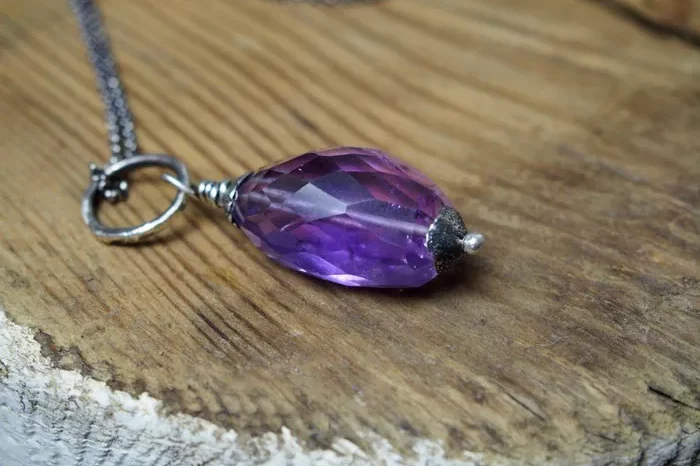Jewelry, an intricate blend of artistry and craftsmanship, often holds significant personal and sentimental value. When a piece like Braxton’s amethyst necklace goes missing, it not only leaves a void in one’s accessory collection but also stirs up emotions and curiosity. To effectively address the question of where this necklace might be hiding, it’s essential to delve into the realms of jewelry characteristics, potential hiding spots, and common scenarios leading to misplacement. This exploration will be presented in a structured, subtitled format suitable for popular science dissemination.
Understanding the Jewelry Item: Amethyst Necklace
The Gemstone: Amethyst
Amethyst, a variety of quartz, is renowned for its captivating violet hue, ranging from deep purple to lighter lavender shades. This gemstone has been cherished for centuries due to its beauty and association with royalty, spirituality, and mystical properties. Its hardness, ranging between 6.5 to 7 on the Mohs scale, makes it durable enough for everyday wear while maintaining its vibrant color.
Design and Craftsmanship
Braxton’s amethyst necklace likely features a central amethyst gemstone, potentially set in a pendant surrounded by smaller gemstones or intricate metalwork. The metal used could be gold, silver, or白金, each adding to the necklace’s overall value and aesthetic appeal. The chain itself could vary in length, thickness, and design, from delicate chains to more robust, statement-making pieces.
Sentimental and Monetary Value
Beyond its physical attributes, Braxton’s amethyst necklace likely carries significant sentimental value, perhaps as a gift, a family heirloom, or a personal acquisition marking a special occasion. Its monetary value, influenced by the quality of the gemstone, metal, and craftsmanship, could range from a few hundred to several thousand dollars.
Common Scenarios Leading to Misplacement
Daily Wear and Removal
Jewelry, especially necklaces, is often removed for various reasons, such as comfort, sleep, or to avoid damage during activities. If Braxton frequently removes the necklace, it might have been misplaced during these routine actions.
Changes in Routine
Significant life events or changes in daily routines can disrupt one’s usual jewelry-handling habits. A vacation, move, or even a busy work schedule might have led to the necklace being placed in an unfamiliar location.
Accidental Loss
Jewelry can sometimes slip off unnoticed, especially if worn loosely or during physical activities. If Braxton was engaging in activities like swimming, exercising, or even gardening, the necklace might have accidentally come off and fallen into an unseen crevice.
Logical Search Strategies
Retracing Steps
Start by retracing Braxton’s steps, focusing on the last known location of the necklace. Consider all areas where the necklace might have been worn, removed, or stored. This includes bedrooms, bathrooms, dressing rooms, and any other personal spaces.
Checking Common Jewelry Storage Areas
Jewelry boxes, drawers, and safes are typical storage areas. Check for any sign of the necklace within these compartments, ensuring that every piece of jewelry is inspected to avoid overlooking it.
Investigating Less Obvious Spots
Sometimes, jewelry can be misplaced in less obvious locations. Consider places where items are temporarily placed, such as countertops, sinks, sofas, or even cars. The necklace might have been set down briefly and then forgotten.
Asking for Help
Involve family members or housemates in the search. They might have seen the necklace last or moved it without realizing its significance.
Detailed Search Techniques
Visual Inspection
Begin with a thorough visual inspection of likely areas. Use good lighting to ensure nothing is missed, especially in dark corners or crevices.
Organized Search
Systematically search each room, starting with the most likely locations and working outwards. This methodical approach can prevent overlooking potential hiding spots.
Using Tools
Employ tools like flashlights to illuminate dark spaces, magnifying glasses to inspect small areas, or even vacuum cleaners (carefully) to check for items that might have fallen into carpets or furniture crevices.
Calling in Professionals
If the necklace holds significant monetary value or holds great sentimental importance, consider hiring a professional jewelry searcher or detectorist. They have specialized equipment and training to locate lost valuables.
Preventive Measures for Future
Designated Jewelry Storage
Create a designated, organized space for jewelry storage. This could be a jewelry box with compartments, a drawer with dividers, or even a wall-mounted organizer. This will make it easier to keep track of jewelry items.
Routine Checks
Develop a routine of checking jewelry before and after activities. This habit can help prevent accidental loss and ensure that items are returned to their proper storage after use.
Insurance and Documentation
Maintain comprehensive documentation and insurance for valuable jewelry items. This not only provides financial protection but also serves as a detailed record in case of loss or theft.
Psychological Considerations
Emotional Attachment
The loss of a sentimental piece of jewelry can evoke strong emotions. It’s important to acknowledge these feelings and perhaps seek support from friends or family during the search process.
Acceptance and Moving Forward
If, despite extensive efforts, the necklace remains unfound, it’s crucial to accept the situation and consider options for replacement or commemorating the lost item in another way.
Conclusion
The mystery of Braxton’s amethyst necklace may seem daunting, but with a systematic approach and the right tools, there’s a good chance it can be found. Understanding the characteristics of the necklace, common misplacement scenarios, and employing logical search strategies will increase the likelihood of success. Additionally, taking preventive measures can help avoid similar situations in the future. Remember, the journey of finding lost jewelry is not just about reclaiming a physical item but often about preserving cherished memories and emotional connections. By following these guidelines, Braxton stands a strong chance of rediscovering their beloved amethyst necklace.
Related topic:
- Amethyst Is Better Light or Dark?
- What Energy Changes Can Amethyst and Olivine Bring Together?
- The Origin and Evolution of Amethyst


